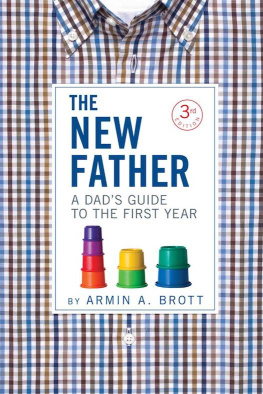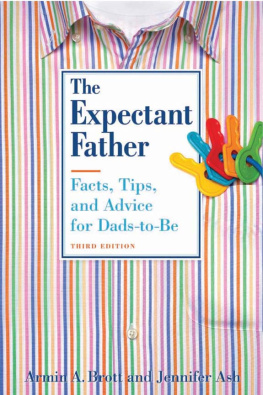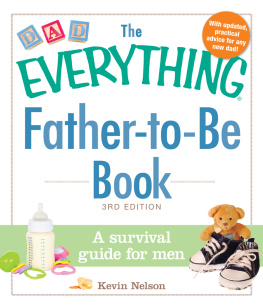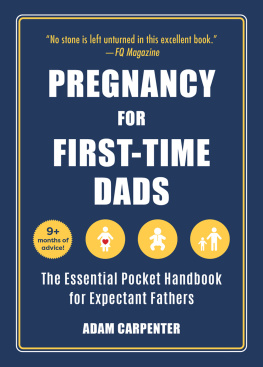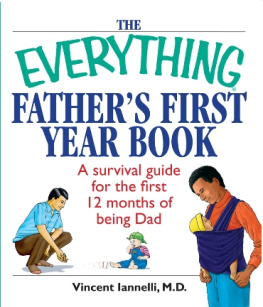Praise for Armin A. Brott and The New Father
The New Father : More than 350,000 copies sold
Read a book? Who has time? But youd be wise to find some so you can take advantage of a fabulous resource The New Father.
Sesame Street Parents
Brott writes honestly and earnestly. His wry sense of humor will be a relief to hassled parents.
Time magazine
[ The New Father ] addresses the many needs and concerns of dads with sensitivity, wisdom, and good humor helpful road map through the often bewildering country of fatherhood.
Brad Sachs, Ph.D., Director, The Father Center
About The New Father: A Dads Guide to the First Year, Third Edition
Faced with the myriad challenges of fatherhood, new dads everywhere have come to rely on the wit and wisdom of Armin A. Brott. In this updated, revised, and expanded handbook, the award-winning author offers even more advice and encouragement and wider coverage to help new dads everywhere become more effective, involved fathers.
Incorporating a wealth of knowledge from top experts, the latest scientific research, and the authors and other fathers personal experiences, The New Father presents invaluable information and practical tips on issues such as charting the babys development, understanding your own emotional and psychological development, understanding how your partner is feeling, and planning your finances. Illustrated with delightful cartoons that underscore the joys and challenges of parenting, The New Father: A Dads Guide to the First Year is an essential resource for every dad.
About the Author
A nationally recognized parenting expert, Armin A. Brott is the author of more than twenty books, including The Expectant Father: The Ultimate Guide for Dads-to-Be and Fathering Your Toddler: A Dads Guide to the Second and Third Years. He has written on parenting and fatherhood for The New York Times Magazine, Sports Illustrated, The Washington Post, Newsweek, and dozens of other periodicals. Armin lives with his family in Oakland, California. To learn more, please visit his website, www.mrdad.com.
The New Father is also available in hardcover and paperback.
To view our complete selection of e-books, visit abbeville.com/digital.
Other e-books in the New Father series by Armin A. Brott
The Expectant Father
The Ultimate Guide for Dads-to-Be
FOURTH EDITION
Fathering Your Toddler
A Dads Guide to the Second and Third Years
SECOND EDITION
Fathering Your School-Age Child
A Dads Guide to the Wonder Years, 3 to 9
The Military Father
A Hands-on Guide for Deployed Dads
The Single Father
A Dads Guide to Parenting Without a Partner
Father for Life
A Journey of Joy, Challenge, and Change
Also available in hardcover and paperback
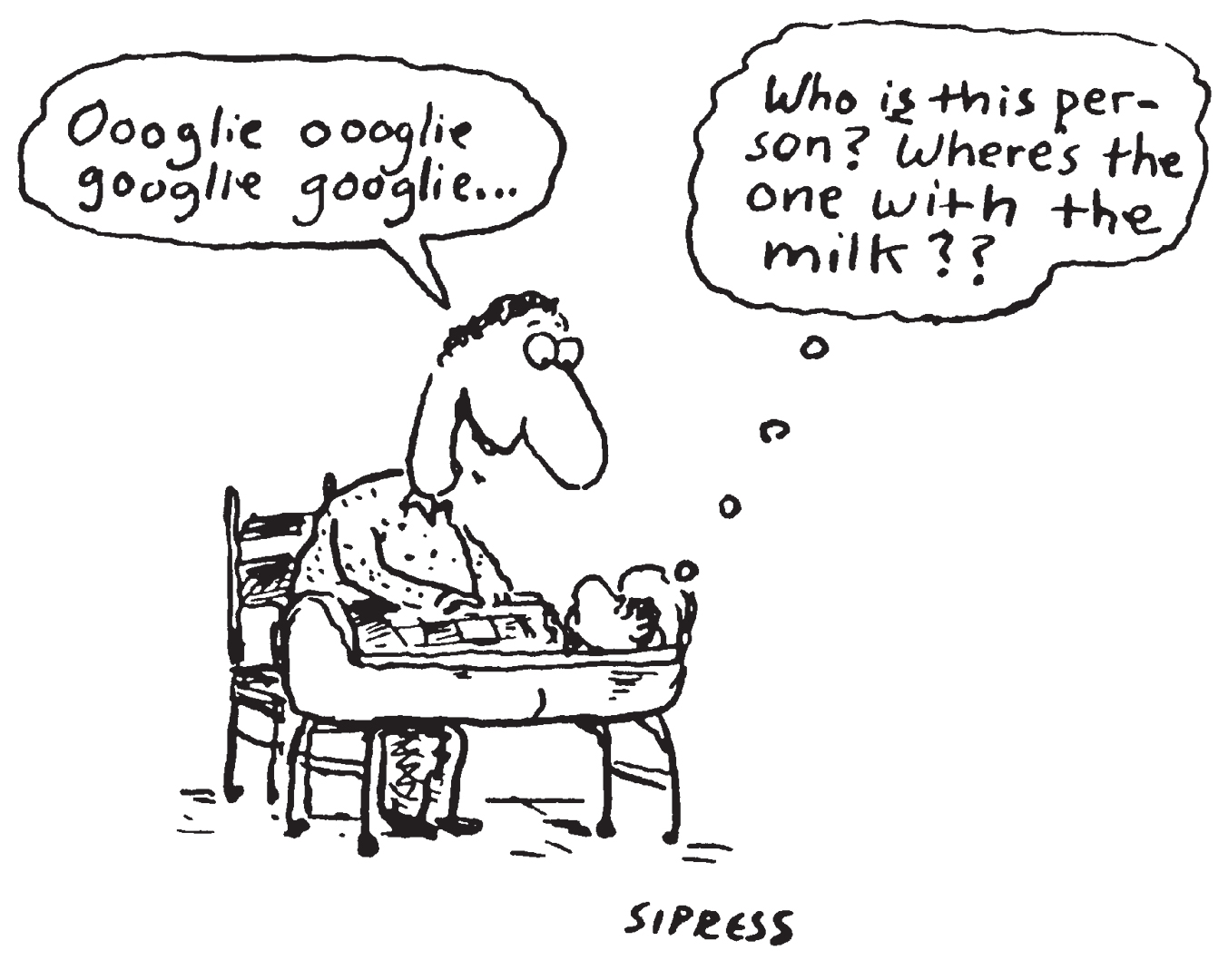
For Zo, Talya, and Tirzah, who teach me every day what fatherhood is all about
Contents
Introduction
Nobody really knows how or when it started, but one of the most widespreadand most cherishedmyths about child-rearing is that women are naturally more nurturing than men, that they are instinctively better at the parenting thing, and that men are nearly incompetent.
The facts, however, tell a very different story. A significant amount of research has proven that men are inherently just as nurturing and responsive to their childrens needs as women. What too many men (and women) dont realize is that to the extent that women are better parents, its simply because theyve had more practice. In fact, the single most important factor in determining the depth of long-term father-child relationships is opportunity.
Basically, it comes down to this: Having children makes you no more a parent than having a piano makes you a pianist, writes author Michael Levine in Lessons at the Halfway Point .
Men and women parent differently in a wide variety of ways:
Dads tend to play more with their children than mothers do, and that play tends to be more rough-and-tumble and more unpredictable than mothers. In other words, dads are more likely than moms to become human jungle gyms.
Dads tend to emphasize independence more than moms and give children more freedom to explore. If a baby is struggling to grab a toy thats just out of reach, mothers are more likely to move the toy closer, while dads are more likely to wait a little longer, seeing whether the baby will be able to get it. Moms are more likely to pick up a toddler whos fallen, while dads are more likely to encourage the child to get up on his own.
Dads tend to use more complex speech patterns than mothers, who tend to simplify what theyre saying and slow it down. Dads also tend to ask their babies more open-ended questions (who, what, where, when, why) than moms, an approach that helps kids expand their vocabulary.
Dads tend to think more about how a child will fare in the world as he or she grows; moms tend to think more about the childs emotional development. When reacting to a test score, for example, a dad might be concerned about how the score will affect the childs future plans and ability to be self-sufficient, while a mom is more likely to be concerned about how the score makes the child feel.
Dads tend to represent the outside world while mothers represent the home. You can see this almost anyplace where parents are out with their babies: dads tend to hold their children face out, while mothers hold them face in.
Please keep in mind here that Im talking about general tendencies . Plenty of moms wrestle with their kids and use big words, and many dads rush to pick up fallen toddlers and hold their babies facing inward. The point is that they parent differentlynot better or worse, just differently. And children benefit greatly from having plenty of exposure to both styles.
It shouldnt come as any surprise, then, that fathers have very different needs from mothers when it comes to parenting information and resources. But more than a decade into the twenty-first century, the vast majority of books, videos, seminars, and magazine articles on raising kids are still aimed primarily at women and focus on helping them acquire the skills they need to be better parents. Fathers have been essentially ignoreduntil now.
HOW THIS BOOK IS DIFFERENT
Because babies develop so quickly, most resources aimed at parents of infants (babies from birth through twelve months) are broken down by month and focus mostly on how babies develop during this period. Thats pretty important stuff, so we spend a little time covering similar territory. However, the primary focus of The New Father: A Dads Guide to the First Year is on how dads change, grow, and develop over the first twelve months of fatherhood. Thats an approach that has rarely, if ever, been tried.
Going from man to father is one of the most dramatic changes youll ever experience. Itll force you to rethink who you are, what you do, and what it means to be a man. Your relationshipswith your partner, your parents, your friends, your coworkerswill change forever as you begin to reevaluate whats important to you and reorder your priorities. Some parts of the man-to-father transition are sudden: one day its just you and your partner, the next day youve got a baby. But for the most part, fatherhood is a gradual, ever-changing process that will last your entire lifetime. Most of us develop and change along fairly predictable lines, but the journey is always a little different for everyone.

